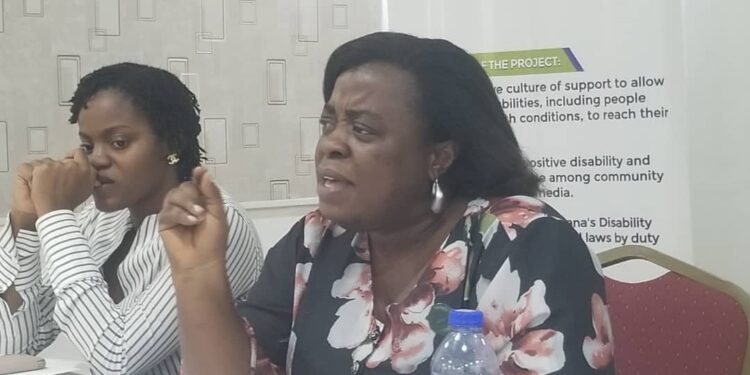Media Urged to Inculcate Issues of Disability in their Editorials to Help Prevent Stigmatization
Issues of Disability over the years have received little attention in the media owing to lack of interest by the media and the society.
The absence of interest in issues of disability has led to stigma and discrimination of persons with Disability (PWDs) and persons with mental health conditions through the use of inappropriate terminologies for PWDs, a situation that places barriers in their way for greatness.

It is in view of this that Hope for Future Generations (HFFG) an NGO, has urged the media to inculcate issues of disability in their editorials to help shape the minds of the society against all forms of stigmatization and discrimination against PWDs and persons with mental health conditions.
The advice was given during a media Training under the theme: “ the Social Behaviour Change Communications and Stigma Reduction for Mental Health and Disability Inclusion Project” organized by the HFFG in Accra on Thursday.
The Project Director of HFFG, Madam Nancy Ansah, speaking at the engagement further emphasized the need for the media to prioritize issues of disability and mental health.

According to her the media is partially blamable for the stigmatization and discrimination against PWDs because of the languages they use in describing people with disabilities and mental health conditions.
She however added that because of the influence the media have on the masses it was important for the media to use positive languages towards PWDs inorder to help change the narrative and put PWDs in a positive light.
“It is important to engage the media to look especially at the language you use, language such as blind man is not acceptable.

We should use positive words that that project people with Disabilities and Mental health conditions in the right frame; they all have capabilities and have potential and that they should be allowed to access every facility and every amenities right from the national to the local level”, Madam Ansah emphasized.
The HFFG Project Director later expressed the readiness of HFFG to always collaborate with the media and further appealed to them to formulate programs around the subject matter since they (HFFG) are ready to avail themselves for discussions and clarifications.
On her part, the Project Manager of Ghana Blinds Union Dr. Elizabeth Zotorvie expressed worry over the low levels of awareness of the media and the general public about disability issues.

She explained that lack of the awareness on the issues by the media is a contributory factor to the stigmatization and discrimination of PWDs.
“Make disability issues a priority. Make disability an integral part of your programs and find out how disability issues are being included in policy implementation”, Dr. Zotorvie stressed.
She further noted that the definition of disabilities disempowers PWDs and Persons with mental health conditions adding that there was the need for the media to use the right languages to describe them such as vision impaired persons instead of visually impaired person, persons with deafness instead of deaf and dumb, persons with mental health condition instead of mad people, among others.

A former Regional Director of GBC, Mr. Sam Kwatia called for the inclusion of disability issues into the curriculum of media institutions.
This he said is the only way the media can appreciate issues of disability and prioritize it.
He later cautioned that disability can happen to anybody within a spell of the moments hence the need to stop the stigmatization and discrimination against PWDs and mental health condition.

Present at the ceremony were, the Project Officer of HFFG, Tony Dogbedo, the Monitoring and Evaluation Officer, Mr. Joshua Hebidzi, and Maame Serwaa a staff of HFFG who earlier took the media through the objectives of the training.
Source:www.senaradioonline.com


